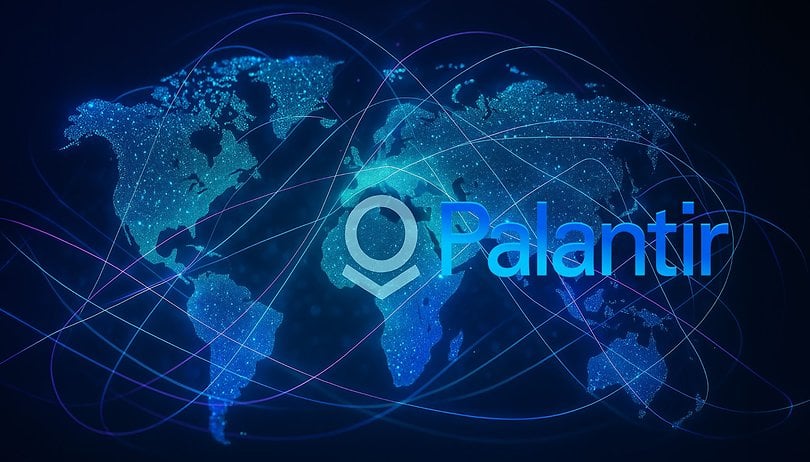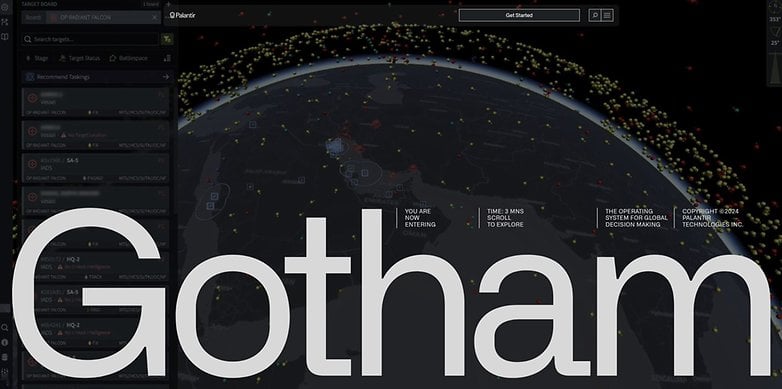Minority Report is Now Reality: What Can Palantir Do?


Palantir is the talk of the town right now. Governments, the police, and shareholders are raving about it. Others are apprehensive and downright fearful of Palantir. However, many people are unaware of what Palantir actually does. How does Palantir help the police — and why are so many people skeptical? We'll find out — right now!
"Palantir? Yes, I've heard of the name before. It has something to do with AI, right? Not to mention big data, right? I've also heard that it works a bit like the movie Minority Report." This or something along similar lines is being touted about the US company Palantir. However, most of us still have no idea exactly what we're talking about here.
We have compiled a concise summary of everything you need to know about Palantir in this article. If someone wants to discuss Palantir with you in the near future, you will now have the necessary information at your fingertips. You'll then be prepared, whether in a pub discussion, banter in the kitchen at a house party, or at a parents' evening.
It is important to note that we bring a very neutral, factual view of the company, which means I present the company and its products while pointing out possible dangers. I don't classify what Palantir does personally, and I don't rate it myself. But please let me know if you would like me to give a personal assessment in another article.
This is Palantir
Let's first clarify which company we are dealing with. Palantir Technologies is a US software company founded in 2003 and based in Denver, Colorado. The software was developed from the outset to make the "flood of data after 9/11" manageable.
Palantir specializes in the development of platforms for the integration, analysis, and visualization of large, heterogeneous data volumes. It sounds complex, but what Palantir really means is that it scrapes all available data that has been lying around for a long time but has not been intelligently linked together.
Incidentally, the name "Palantir" comes from J.R.R. Tolkien's "The Lord of the Rings" universe and refers to the seeing stones in the novel. It intends to symbolize the company's mission to make huge amounts of data visible. I won't comment on whether you really want to be monitored by something like Sauron's eye.
The company was primarily co-founded by Peter Thiel and financially supported by the CIA's investment arm, In-Q-Tel. Its initial focus was on the fight against terror. Palantir became famous for its data analysis software, which we will discuss in more detail later. Both government agencies and commercial enterprises are among its grateful customers.
Palantir has been listed on the stock exchange since 2020 and was valued at around $50 billion for years. From then on, things went steeply uphill, so that about a year later, the group was valued at approximately $360 billion.
The Brains behind Palantir: Between Vision and Provocation
First of all, of course, there is the aforementioned Peter Thiel, a German-American investor and tech billionaire. He is known for his sometimes far-right and anti-democratic views. He is also known for his close ties to the US intelligence services and personalities such as Donald Trump. Thiel was also a co-founder of PayPal (together with Elon Musk) and an early investor in Facebook. His personal fortune is estimated at just under $20 billion.
Thiel already supported Donald Trump in his 2016 election campaign and also financed JD Vance's entry into politics. Vance even worked for Peter Thiel at the time. The three powerful men have both friendly and ideological ties.
The second key figure in the company is the current CEO of Palantir, Alex Karp, who is also a co-founder. Karp is often described as eccentric. He holds a doctorate in philosophy from the Johann Wolfgang Goethe University in Frankfurt am Main and speaks good German. Formerly known for left-liberal positions, he now stands for the defense of Western values and democracies.

Alex Karp has an estimated fortune of $9.7 billion, and Time magazine ranked him as one of the 100 most influential people of 2025.
Less mentioned in the media, but just as important for the company: Stephen Cohen, also a co-founder and currently a member of the Board of Directors at Palantir, among others. He studied computer science at Stanford University. With his knowledge of machine learning and AI, he was able to develop the prototype that finally opened the door to the US government for Palantir.
What does Palantir do?
Palantir primarily provides software platforms that enable institutions to analyze big data by converting vast amounts of information into an integrated data set that mirrors their real-world operations. Importantly, the company itself does not create or sell data, but helps to interpret existing data. Palantir's core products are Gotham and Foundry, supported by Apollo and the Artificial Intelligence Platform (AIP).
Gotham
Gotham was originally developed for defense and intelligence analysts and was the company's first software platform (named after Batman's hometown). It is mainly used in law enforcement, counter-terrorism, intelligence, and financial crime.

And how does it work? Gotham specializes in integrating and analyzing large amounts of data from various sources and presents it in a user-friendly manner. Once linked, the software enables the visualization of data points like people, places, events, financial transactions, and communication data. It can search through various police and government databases simultaneously and merge information efficiently.
A key feature is AI-supported pattern recognition, which identifies anomalies and hidden patterns and derives predictions, enabling predictive policing.
Foundry
Foundry was developed in 2016 to transform the way companies interact with information through a centralized operating system for their data. It is used in almost all industries, such as healthcare. Foundry is also used in financial services, the automotive sector, retail, and telecommunications.
The powerful data platform provides a real advantage to gain valuable insights and make data-driven decisions. A key feature is its modularity, which allows customers to purchase only the components they need, facilitates customer acquisition, and accelerates pilot projects.
Apollo
Apollo by itself is not a standalone product, but a continuous delivery system that powers Gotham and Foundry. It enables Palantir's products to run in places that other SaaS (Software as a Service) platforms cannot reach, such as segregated environments (e.g., drones and submarines) or purpose-built government clouds.
Apollo delivers continuous updates to the platforms (more than 41,000 times per week), ensuring users always have the latest technology and reducing the workload for engineers. It gives Palantir an important competitive advantage over traditional SaaS products.
AIP
Finally, AIP stands for Artificial Intelligence Platform and integrates generative AI and LLMs (Large Language Models) into the existing Foundry and Gotham platforms. AIP improves data analysis and decision-making processes through machine learning and predictive analytics. It can be deployed on Oracle Cloud Infrastructure (OCI) and is tailored for various customer segments, including government and private companies.
Where is Palantir Already in Use?
Palantir has a broad customer base, including both government and commercial customers as mentioned above. Reports point to 149 customers, with the majority of revenue coming from government contracts.
Worldwide and in the USA
Palantir has become particularly well-known for its work with US government agencies. The US intelligence agencies (CIA, NSA), the military (US Army, Space Force), and law enforcement agencies (FBI, ICE) are major users of Palantir Gotham, particularly in the fight against terrorism and intelligence gathering.
Palantir is regarded in the USA as a kind of "secret weapon" to combat organized crime and predict crime (predictive policing). It helped the US army in Afghanistan and Iraq to evaluate battlefield and secret data in real-time.
In the healthcare sector, Palantir was used by the British NHS to coordinate the COVID-19 response, for example. Companies such as Airbus, BMW, and Merck also use Palantir's software.
Differences compared to US Use
While Palantir is used extensively across a wide range of sensitive areas in the USA, its use in other countries could be subject to strict legal restrictions and debate. After all, the software makes it possible to create comprehensive profiles of individuals, groups, and networks without sufficiently distinguishing between suspects and innocent bystanders. Perhaps strict requirements like the use of such analysis platforms must, therefore, be clearly limited to specific threats or certain serious crimes could be implemented for better controls.
There are also concerns regarding the US CLOUD Act. This allows US authorities to access data held by American companies, even those outside of the USA, in theory.
Critics are calling for maximum transparency and control to prevent misuse. In contrast, the use of such technology in the USA, such as the collection of data on undocumented immigrants by ICE, is highly controversial. Palantir itself stated that it does not sell its products to China or other undemocratic actors.
Palantir in Commercial Use
In the current discussions about Palantir, it is often forgotten that the company also has many customers in the commercial sector. Airbus, for instance, uses Palantir to control and optimize production and supply chains. The German pharmaceutical company Merck, BP, Credit Suisse, and Fiat Chrysler also count on Palantir's qualities. Watch the video to see how Ferrari benefits from Palantir:
What makes Palantir Dangerous?
The use of Palantir software raises considerable concerns outside of the USA about data protection, sovereignty, transparency, and ethical issues. Once again, we do not judge Palantir's actions in this article, but rather, point out potential dangers as neutrally as possible.
1. Data protection problems and interference with fundamental rights
The software enables the uncontrolled linking of data from a wide variety of sources. These include police databases, health data, social media, and residents' registers. This leads to the creation of comprehensive personality profiles, even of witnesses, victims, or completely uninvolved persons who happened to be in contact with a wanted person. Those concerned about data security and privacy warn of a "transparent citizen" and a "breach of the dam towards total surveillance".
2. Lack of transparency and proprietary structure ("black box")
Palantir's AI algorithms often act as a kind of "black box". In other words, the exact function and process of the data remain opaque. This makes it practically impossible to check for GDPR compliance and makes external auditing more difficult. Even official supervisory bodies are not given any insight into the data processing logic, and the company regularly refuses to provide information on data flows. Critics have therefore long been calling for greater transparency of the algorithms.
3 Geopolitical dependencies and sovereignty concerns
As a US company, Palantir is subject to the CLOUD Act, which gives US authorities access to data stored by American companies, even outside the USA. This entails the risk that business secrets or sensitive customer data could be passed on to US authorities.
This dependency is seen as a threat to the digital sovereignty of other countries. Countries such as France and Germany are therefore developing their own solutions to bypass US providers, but for some, this would take so long that, at best, they could have to rely on Palantir far longer than expected.
4. Reputational risks due to political ties
Co-founder Peter Thiel's close ties to Donald Trump and his sometimes anti-democratic views have had a negative impact on Palantir's acceptance in selected countries. This has led to public relations crises, resistance from employees and customers, and calls for a boycott. The association with the outright hunt for immigrants in the USA is viewed critically.
5. Potential for abuse and "function creep"
A tool as powerful as Palantir arouses desires and could be used beyond its originally intended purpose. What is permitted for counter-terrorism could later be used to fight crime in general, at demonstrations, or even to persecute critics of the system. This type of misappropriation is also known as "function creep".
There are, therefore, concerns that data could also be misused to prosecute petty crimes such as bicycle theft or cannabis use, for instance, instead of being limited to serious crime as envisaged in theory. In the USA, this is already happening in some areas.
6. Discrimination and faulty algorithms
When AI and algorithms recognize patterns, there is always a risk of bias, i.e., systematic distortions. In the USA, predictive policing systems showed racist tendencies by disproportionately predicting crimes in neighborhoods with minorities. Since police records often already overrepresent people of color, automated analyses can reinforce this discrimination. This, in turn, can lead to certain populations being unfairly targeted.
7. Lack of exit strategies and high costs
There is a risk of a so-called "vendor lock-in". This means a customer can only switch providers with great effort. Palantir does not offer any exit strategies for data migrations, which makes it significantly more difficult to switch to other software at a later date and can be associated with high migration costs. Licensing and operation itself are also associated with very high costs (from over $1 million/year for enterprise licenses).
Conclusion
I hope that you now have a more comprehensive and objective picture of Palantir. To summarize, Palantir is currently an almost unrivalled powerful tool that can support investigative authorities in the fight against complex crime. Palantir constantly emphasizes it does not create or even sell any data itself. Palantir only connects the dots that already exist.
On the other hand, there is a lack of transparency, far-reaching possibilities for encroaching on privacy, potential political influence, and the risk of technological dependency. I am therefore also convinced that Palantir concerns us all, especially if a government other than the US works with Palantir.
In my opinion, the current debate illustrates the attempt to find a balance between security gains and the protection of civil rights in times of digital change. Please let me know your thoughts on Palantir: do you see the need to use all available data at all costs to fight terrorism and crime? Or are you one of those who are skeptical or even fearful of this company?



















